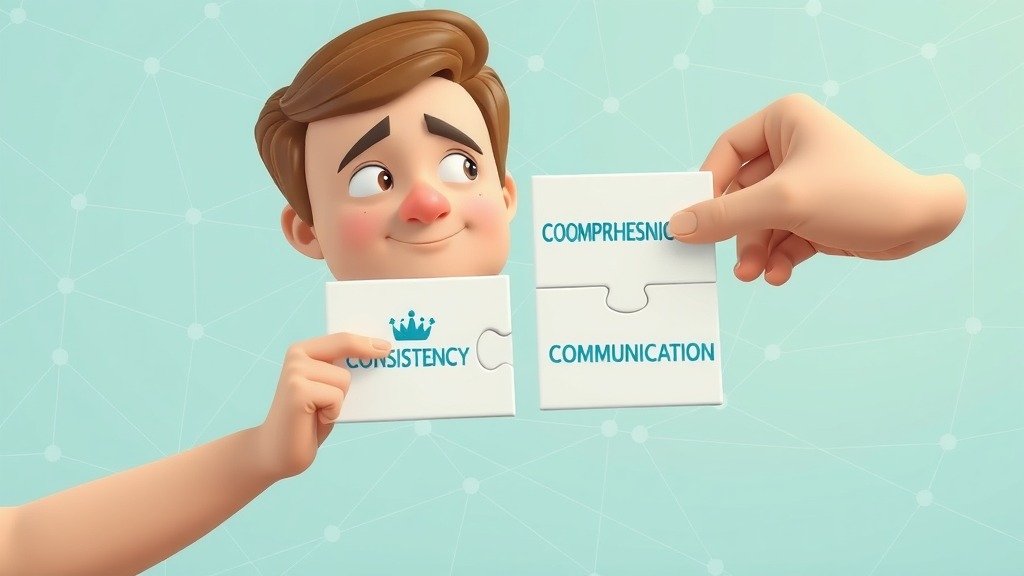"Did you know that nearly 60% of adults in the US live with at least one chronic condition, and 42% have more than one? Managing these conditions goes far beyond just taking medication—it's about taking charge of your entire well-being."
Understanding Chronic Condition Management: A Comprehensive Guide

- Definition and importance of chronic condition management: Chronic condition management refers to the ongoing strategies, tools, and partnerships involved in controlling symptoms and improving quality of life for individuals with lifelong health challenges. It's not just about following doctor's orders—it's about making informed choices every day.
- Difference between chronic condition, chronic disease, and chronic care management: While "chronic condition" is a broad term covering persistent health issues like diabetes or arthritis, "chronic disease management" focuses on specific clinical actions to control a diagnosed disease. "Chronic care management" (CCM) describes coordinated efforts between patients and their health care team to monitor, treat, and support individuals with multiple or complex conditions.
- Key goals of effective disease management: The main objective is to reduce symptoms, slow disease progression, and empower patients to engage actively in their care. This approach also aims to prevent hospitalizations, lower health care costs, and improve patient outcomes and satisfaction across the health care system.
When you're managing chronic conditions , it's essential to partner with your care team, understand your health records, and build a treatment plan tailored to your needs. Personalizing your management plan can give you more control over your symptoms and daily life, allowing you to thrive in spite of your diagnosis. Remember, disease management is a journey that requires commitment, collaboration, and continuous learning—quite different from managing a single acute illness.
Key Facts About Chronic Condition Management
| Program Feature | Benefit for Patient | Impact on Health Outcomes |
|---|---|---|
| Personalized Treatment Plans | Care tailored to specific needs and symptoms | Improved disease control and fewer complications |
| Interdisciplinary Care Teams | Access to a range of care professionals | Comprehensive, coordinated approach to health |
| Digital Health Monitoring | Convenient tracking of health data and symptoms | Early detection of problems, reduced ER visits |
| Ongoing Education & Support | Patient empowerment and better self-care | Higher satisfaction, lower health care costs |
Chronic condition management programs come in diverse forms, but the best share one aim: to improve patient quality of life while controlling disease progression. Integrated health services, CCM services, and dedicated disease management plans reduce hospitalizations, help patients better manage chronic conditions, and offer significant cost savings to the health care system .
It takes a coordinated effort between the care provider, patient education, monitoring tools, and your care team. By understanding these features, you’ll be able to select or ask your doctor about management programs that fit your lifestyle and health goals.
Why Chronic Conditions Require Long-Term Disease Management
Unlike acute illnesses, chronic diseases such as diabetes, hypertension, asthma, and heart disease persist for years and can’t be “cured” with a single intervention. They require a consistent, proactive management program geared towards slowing progression, minimizing symptoms, and maintaining daily functioning. Nearly half of adults in the United States will experience at least one chronic condition during their lifetime, which makes effective disease management a top priority in today’s health care landscape.
Chronic care management addresses not just the medical aspects of disease, but also the emotional and social impacts. For instance, these conditions often disrupt routines, restrict physical activity, and present ongoing financial and emotional stress. Barriers like limited health literacy, fragmented care teams, and rising health care costs can make managing chronic diseases even more challenging.
To achieve successful chronic condition management, you must work closely with your care team, communicate openly, and use resources such as CCM services when available. The support of a dedicated care professional, regular communication, and a tailored treatment plan all contribute to better health outcomes and a higher quality of life .
Types of Chronic Diseases and Common Challenges in Chronic Disease Management
- Diabetes, Hypertension, Asthma, Heart Disease: These conditions require careful monitoring, daily self-care, and ongoing collaboration with your health care provider. Each disease has unique treatment needs and potential complications.
- The impact of chronic conditions on daily life: Symptoms such as pain, fatigue, or shortness of breath can disrupt work, relationships, and everyday routines. Adjusting lifestyle while maintaining disease control requires perseverance and support.
- Barriers to successful chronic care: Navigating multiple medications, complex care systems, insurance coverage, and out-of-pocket costs can overwhelm patients. Many struggle with access to patient education or electronic health records that coordinate information for the entire care team.

Core Components of Chronic Condition Management Programs
- Individualized treatment plan creation: Every journey is different; a tailored treatment plan matches specific symptoms and goals, adapting as your needs evolve and providing you with the tools to manage your condition.
- Role of care professionals and health care teams: Your care team—a group that may include primary care providers, specialists, nurses, pharmacists, and care coordinators—works together to monitor your progress, communicate care plans, and offer ongoing support.
- Health services that support chronic disease management: From remote monitoring to on-site education, health services like CCM, nutrition counseling, physical therapy, and digital health platforms play a vital role in empowering you to take charge of your health.
An effective chronic condition management program brings together expert oversight, updated electronic health records, and accessible patient education tools. These resources are pivotal for improving patient satisfaction and lowering healthcare costs over the long term.
Communication across the care team—supported by real-time data and shared health records—ensures consistency in your care, identifies gaps, and fine-tunes your plan for the best possible results. Leveraging every team member’s expertise empowers you to reach your health goals.
Innovative Tools and Health Services for Effective Care Management

- Digital health apps for self-management: Today’s mobile applications allow you to track your symptoms, medications, and lab results from anywhere. These platforms serve as personal health assistants, empowering you to better engage with your care management program and manage chronic diseases with greater independence.
- Telehealth and remote monitoring: Access to virtual visits and connected devices enables clinicians to detect issues early and adjust treatment plans immediately. It also makes it easier for patients with mobility challenges to stay in touch with their care team from home.
- Case studies: Real-life results from modern care management methods: Recent studies show that patients who use remote monitoring and digital health tools report fewer ER visits, better disease control, and improved quality of life. They also experience more productive interactions with their health care team, fostering a collaborative approach to managing chronic conditions.
Embracing technology can transform your approach to chronic condition management. By integrating wearable trackers with your electronic health record, both you and your care professionals can spot trends, adjust medications, and intervene earlier when problems arise. In the long run, this leads to better health outcomes, reduces care costs, and keeps you more connected with your care providers.
Many patients report that digital health platforms keep them motivated and accountable while providing peace of mind. If you’ve yet to try a health management app, consider asking your care professional or health team member for recommendations tailored to your diagnosis.
How to Build Your Personalized Treatment Plan for Chronic Diseases
- Collaborating with care professionals: Effective chronic disease management starts with honest communication. Engage regularly with your care team, ask questions about your diagnosis, and understand each step of your treatment plan.
- Self-care habits and chronic care strategies: Success depends not just on what happens at the doctor’s office, but on daily routines—eating a balanced diet, staying active, monitoring symptoms, and managing stress are crucial. Educate yourself using trusted resources or patient education materials provided by your care team.
- Tracking progress and adapting your management program: Use journals, apps, or connected devices to monitor changes in symptoms and lab results. Share updates with your care professional to adjust medications, exercise plans, and self-management strategies as needed.
Don’t be afraid to make changes if your management program no longer fits your routine or health goals. Chronic condition management demands flexibility and adaptation—qualities that are just as important as commitment and routine.
"It is not the strongest of the species that survive, nor the most intelligent, but the one most responsive to change." – Charles Darwin
The 4 C's of Chronic Disease Management: What Every Patient Should Know

- Comprehension: Clearly understanding your chronic condition and treatment plan empowers you to make smart health decisions and manage risks.
- Coordination: Ensures your care team—including all providers, specialists, and support personnel—are aligned and sharing information for a seamless health care experience.
- Consistency: Adhering to your treatment plan, attending regular check-ups, and maintaining healthy habits are crucial for controlling disease progression and maximizing health outcomes.
- Communication: Keeping an open dialogue with your care professionals fosters trust, clarifies questions, and ensures adjustments can be made promptly as your needs evolve.
These 4 C’s form the foundation of effective chronic care management. Embrace them, and you’ll build stronger partnerships with your healthcare team, resulting in better disease management, lower care costs, and an improved quality of life.
If you’re struggling to coordinate among multiple providers or keep up with complex regimens, don’t hesitate to ask your care team for resources, reminders, or support. Communication is the key to eliminating confusion and maximizing the benefits of your management plan.
Qualify for CCM: Medicare and Health Insurance for Chronic Care Management
- Eligibility criteria for CCM services: If you have two or more chronic conditions expected to last at least a year, you may qualify for chronic care management through Medicare or certain private insurers. Such services are designed to help you manage your illnesses in collaboration with a care management team.
- How much does Medicare pay for CCM? Medicare Part B reimburses healthcare providers for delivering CCM services at rates ranging from $42 to $94 per month, depending on the complexity and time required for each patient’s care. This coverage minimizes out-of-pocket care costs and expands access to essential health services.
- Navigating insurance for chronic care support: Many plans now include some form of disease management or CCM. Ask your primary care provider or case manager for assistance understanding coverage, obtaining authorizations, or finding low-cost options for comprehensive care management.
Leveraging your eligibility for CCM services can take the burden off daily self-management and link you with a wider network of support. With the right insurance and health care system in place, you’ll find it easier to maintain your health and reduce stress and cost burdens along the way.
Always double-check your insurance benefits annually; changes in policies might bring new opportunities for more robust disease management and coordination through your healthcare plan.
People Also Ask About Chronic Condition Management
What is chronic condition management?
- Chronic condition management refers to a proactive approach in which patients, caregivers, and healthcare teams work together to control symptoms, prevent complications, and optimize quality of life for those facing lifelong health challenges.
What are the 4 C's of chronic disease management?
- The 4 C's are Comprehension, Coordination, Consistency, and Communication—core pillars that bolster effective disease management for chronic conditions.
What is the hardest chronic illness to live with?
- While experiences vary, many patients and care professionals highlight chronic illnesses such as fibromyalgia, COPD, and advanced heart disease as especially challenging due to their pervasive impact and complexity.

How much does Medicare pay for CCM?
- Medicare Part B covers chronic care management (CCM) services for eligible beneficiaries, reimbursing healthcare providers around $42–$94 per patient per month, depending on the complexity of the care provided.
Top Tips for Long-Term Success in Chronic Condition Management
- Set realistic health goals—track progress using digital tools: Celebrate incremental victories and monitor your health journey with apps or journals.
- Build a collaborative relationship with your health care team: Partnering with a supportive care team ensures more personalized and attentive care.
- Explore CCM services and support networks: Don’t go it alone! Connect with CCM programs, support groups, and community health resources to expand your care options and emotional network.
- Maintain healthy lifestyle habits: nutrition, exercise, stress management: Prioritize what you can control to ease symptoms and reduce flare-ups.
- Adjust your management program as your needs change: Remain flexible—what works today may need a refresh tomorrow.

Integrating these strategies into daily life helps improve patient engagement, reduces care costs, and enables you to manage chronic conditions with confidence. Small steps add up to significant long-term benefit, so keep experimenting with new tools and ideas until you find a routine that really works for you.
Remember: long-term success is not about perfection, but about progress, self-advocacy, and being proactive with your care provider and health care team.
FAQs: Common Questions for People with Chronic Conditions
- Can I manage chronic diseases on my own? While some day-to-day actions are under your control, partnering with a care professional ensures you receive updated evidence-based advice, ongoing monitoring, and emotional support. Patient education and health services are designed to complement your self-care.
- What role do care management programs play in improving outcomes? Management programs help coordinate your care team, reduce health care costs, and streamline complex tasks like medication management and symptom tracking. They also empower you with resources, reminders, and education for better health outcomes.
- How do I get started with chronic care management? Speak with your primary care provider to discuss eligibility for CCM services or chronic disease management programs. Review your health insurance benefits and look for local or virtual resources designed for people with similar chronic conditions.
- Are there resources for low-cost or free disease management? Many community clinics, nonprofit organizations, and public health agencies offer free or reduced-cost patient education, self-management classes, and group programs. Ask your healthcare professional or insurer for a referral to these essential services.
Key Takeaways for Effective Chronic Condition Management
- Understand the unique aspects of your chronic condition
- Leverage care management and CCM services
- Partner with care professionals and health care teams
- Focus on continuous learning and adjustment
Take the Next Step on Your Chronic Condition Management Journey
- Climb Aboard the Wellness Train! Ready to take control of your health—one smart step at a time? Explore more tips, tools, and real-life strategies to help you live better with chronic conditions. 👉 Join the Wellness Seekers today for exclusive guides, expert insights, and everyday solutions! Hop On the Train Now!
Action Steps: Begin building your treatment plan, connect with your care team, and make proactive use of digital or community resources available to you today.
 Add Row
Add Row  Add
Add 




Write A Comment